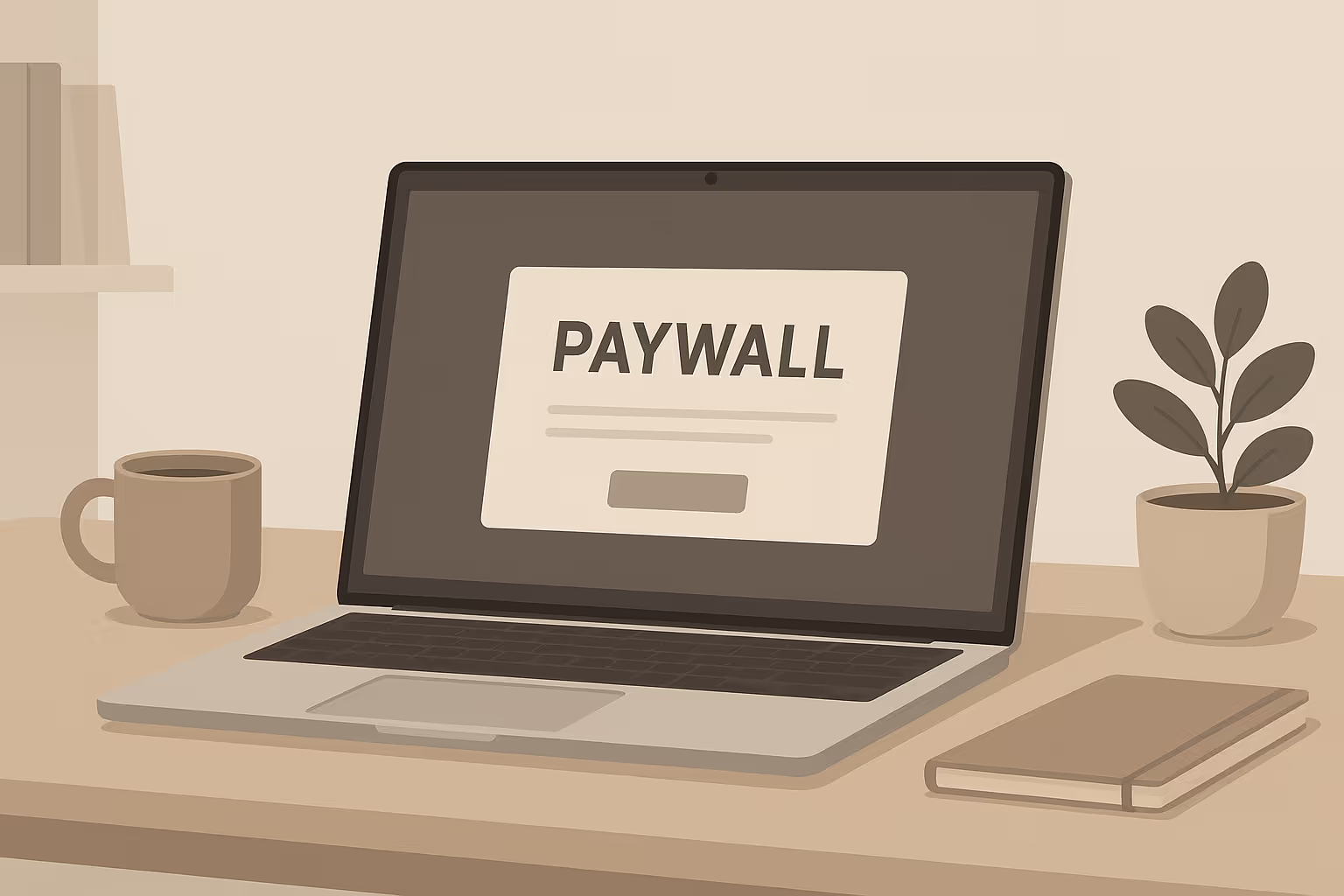There are few things more frustrating than when you need to research a specific subject or a major news story breaks, and you hit a paywall as soon as you click the link. It’s an increasingly common issue, but there are legitimate solutions for how to read news articles behind paywalls. In this blog, we’ll discuss how you can access quality journalism links without crossing legal or ethical lines.
Why Gated Content Is a Necessary Part of Online Journalism

Throughout its history, digital journalism has consistently struggled to generate revenue. In the 1990s, everyone offered access to their content free of charge, believing that online ad revenue would make up for dropping subscriber numbers and declining newspaper sales. According to a recent Pew Research Center survey, 83% of Americans report not having paid for news in the past year.
Fast forward to now, where digital journalism is facing historically low ad revenue, rising content costs, and the need to maintain quality reporting. Paywalls have repeatedly emerged as a potential revenue solution, but many are resistant to gated content, no matter how necessary it is for sustaining journalism as a business.
It’s not easy for outlets, and paywalls are a growing pain until alternative monetization methods are more widely adopted. But while paywalls are currently necessary, there are right and wrong ways to navigate them.
What Not to Do: Unethical and Illegal Workarounds

With the rise of paywalls, there has also been an emergence of illegal and unethical workarounds. These include tactics like:
- Browser extensions that bypass paywalls
- Scraper sites or third-party PDF reposts
- Clearing cookies in violation of the terms of service
- Disable JavaScript
- Browsing in incognito mode
- Use a VPN or Proxy to mask your IP address
Each of these tactics is a method that willfully obscures central features or circumvents a website’s intended navigation. These tactics hurt publishers and violate trust, as they won’t be paid for access. And it perpetuates the idea that online content lacks value and that online authors are not entitled to compensation.
Legal and Ethical Ways to Access Paywalled Content

In the next section, we’ll discuss the most legal and ethical methods to access paywalled content, including free trials, institutional access, news aggregators, and personal links from journalists.
Use Free Article Allowances
Many outlets offer a set number of articles before reintroducing a paywall. Outlets like The New Yorker and Vulture are two examples of publications that limit readers to five free links per month.
Take Advantage of Free Trials or Intro Offers
Many major publications, including The Atlantic, The New Yorker, and The Wall Street Journal, offer monthly free trial periods for new users in exchange for an email address. These trial periods enable users to explore and evaluate content before making a subscription.
Other outlets, such as USA Today, may also offer special promotions, like discounted access for one dollar a month for six months. With these offers, you can temporarily bypass paywalls without guilt.
Access Through Libraries, Institutions, or Workplace Subscriptions
Most libraries, institutions, schools, and even some workplaces also have access to major publications and subscription-based research sources. Digital platforms like Libby, JSTOR, or ProQuest all enable individuals to access published material that’s usually gated. All you need is your library card, school ID, or other form of personal identification to use these tools.
Use News Aggregators or Curated Newsletters
News aggregators like Google News, Apple News, and Flipboard all offer shortened summaries or partial previews of stories. Also, curated newsletters have exploded in popularity, with the global daily newsletter market size priced at $14.2 billion in 2024. Available as both an outlet and individual newsletters, curated newsletters are an effective way to access paywalled links without punishing that outlet by bypassing the paywall.
Follow Journalists and Publications on Social Media
When you follow individual journalists and publications on social media platforms like Bluesky and Facebook, you will often receive open-access versions or alternative publication links for specific articles. Like other methods here, these gift links are designed to incentivize readers to subscribe or sign up for other offers.
Why the Future Needs More Flexible Models

The methods listed above are temporary solutions, underscoring that current traditional subscription-only models don’t accommodate casual or price-sensitive readers. Readers may support the outlets by accessing and enjoying a few individual articles, but that doesn’t guarantee a commitment to monthly access.
There’s an opportunity for frictionless monetization innovations like microtransactions and a more flexible model that approaches news articles as pay-per-use content, similar to many SaaS products. Readers will finally have a way to access what they want without worrying about paywalls.
A Smarter Alternative: How Supertab Supports Ethical Access

Through Supertab’s aggregated microtransactions tab system, publications will have the freedom to customize their own mutually beneficial pay-as-you-go content model. This flexible approach allows readers to support journalism without subscribing to every outlet.
Instead, they can choose to buy access to a single article, access for a specific time period, or contribute their own content. Additionally, publishers can unlock revenue from sporadic readers in a user-friendly and ethical manner.
Give Readers Flexible Access, Without Sacrificing Revenue

There’s no getting past the financial realities of digital journalism. Still, readers want and deserve ethical, low-friction ways to access the best stories without committing to full subscriptions or trials that they’ll forget about in the next week. And while paywalls help publishers stay in business, they also hinder engagement.
For readers who prefer a more flexible, pay-per-use system and publishers seeking to monetize their content more effectively, Supertab offers a solution that bridges these needs. With its intuitive user-centric design, full API access, and easy checkout system, Supertab enables readers to keep up with every news story.



.svg)

.avif)


